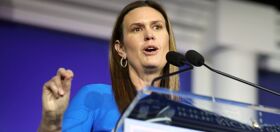
“V-e-r-y s-l-o-w-l-y,” the chances of states adopting gay marriage laws is “getting better.” This, according to stats whiz Nate Silver, who’s still reeling from his prediction that Maine would uphold marriage, only to be proven wrong by voters. But because he’s in the business of finding explanations, and rationalizing outcomes, he crunches some new figures — and throws in the “constitutional amendment” factor. What’s the new result?
But it has since occurred to me that there was one important factor that the model may have missed — something I’d mentioned in passing but not thought seriously about. In Maine, in contrast to every other state that voted on gay marriage, there was not a constitutional question at stake. Question 1 did not amend the state’s constitution; it merely ‘vetoed’ the law that the legislature had passed.
[…] Does this make a difference? Because Question 1 was the first gay marriage ballot initiative not to impact its state’s constitution, there is no good comparable at the state level. But some national numbers suggest that it the wording of the initiative might have mattered.
[…] What that means is that there’s a “swing vote” of about 10 percent of the electorate that is not yet ready to allow gay marriage, but is also not willing to ban it (at least not Constitutionally). This is enough to tip the national balance on the question of gay marriage. And it may have tipped the balance in Maine. Question 1 did not actually ban gay marriage but rather overturned the legislature’s affirmation of it.
I realize that this will seem like a semantic distinction, but such distinctions are frequently important in polling and it stands to reason that they might be important for ballot initiatives as well. Besides, the distinction is not entirely semantic; since constitutional amendments have a higher bar to clear in Maine, requiring the approval of 2/3 of the legislature in addition to a majority of the people.
Fine, but where does that get us?
Firstly, I don’t think there is any evidence of a national backlash against gay marriage. It should be borne in mind that gay marriage is still opposed by a small majority or large plurality of Americans. But there’s not really any evidence that the numbers are getting worse; instead, they appear to be v-e-r-y s-l-o-w-l-y getting better.
Secondly, it’s not clear that the results in Maine are comparable to those in other states. Question 1 was the only gay marriage ballot initiative that did not seek to rewrite its state’s constitution. If Question 1 had addressed the same question as Proposition 8 in California, which did alter its state’s constitution, it might not have passed.
Thirdly, building statistical models is tricky. It is good practice to model one’s uncertainty whenever we are forecasting a result. But very often, there is uncertainty about the uncertainty.
Or, in layman’s terms: For all the “progress” we’ve made, Americans still don’t really want to enact equality, and trying to predict when and where they will is, at best, like asking whether or not there’s another Tiger Woods mistress waiting in the wings: Probably, but maybe not, though we won’t know for sure until she smacks us in the face.
How about we take this to the next level?
Our newsletter is like a refreshing cocktail (or mocktail) of LGBTQ+ entertainment and pop culture, served up with a side of eye-candy.


















Just stop
Got it. Added to the list of people who Queerty thinks are idiots and know nothings about politics is Nate Silver. Thank god for the brilliant political analysis on this site!
AndrewW
This explanation still doesn’t add up to what happened in Maine. It was turnout, turnout, turnout. Polling still indicates a majority of Maine residents support marriage equality. We lost because we didn’t inspire enough people on our side to get out and vote. The other side did – with money and their 1,500 churches. We had poor turn out in rural areas (as expected) but also across the board. God told the opposition to get out and vote – we didn’t respond with something as powerful.